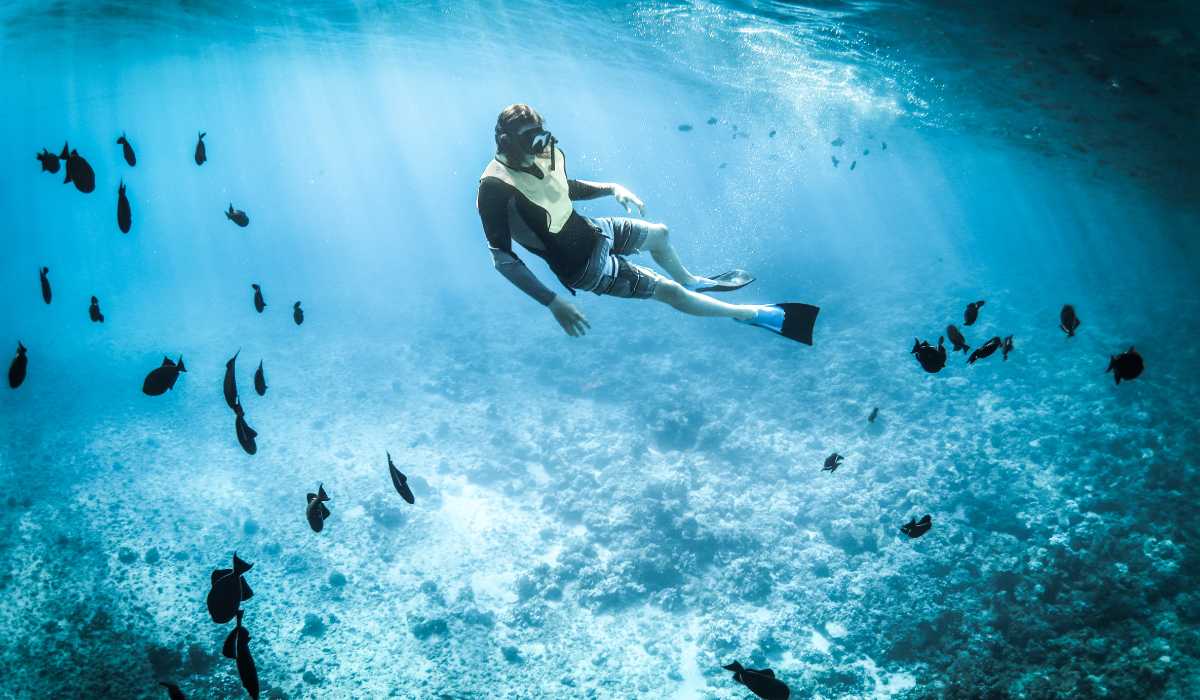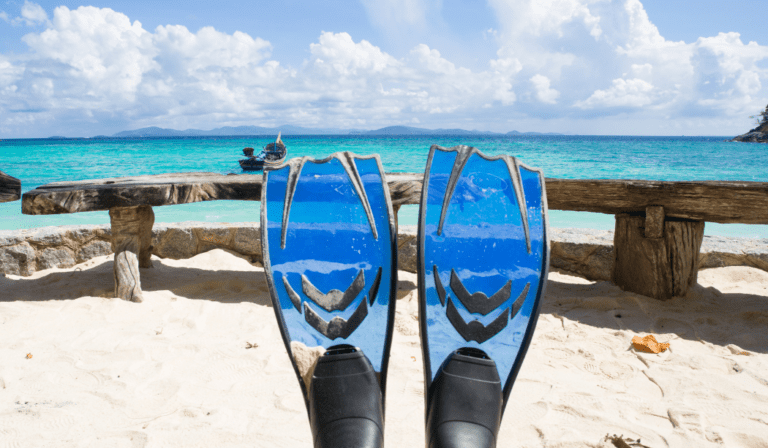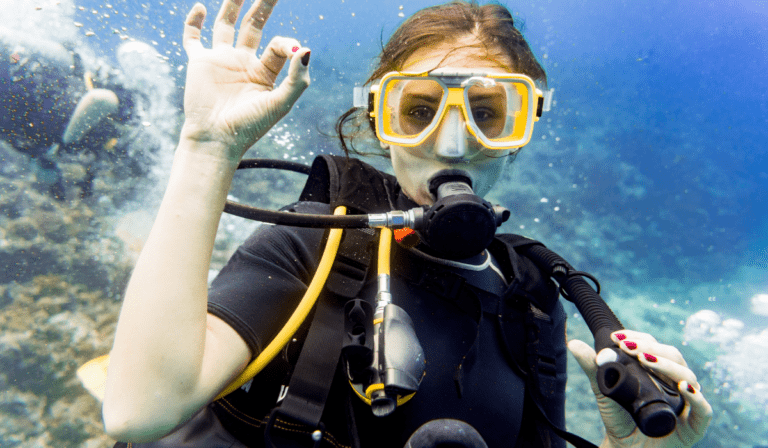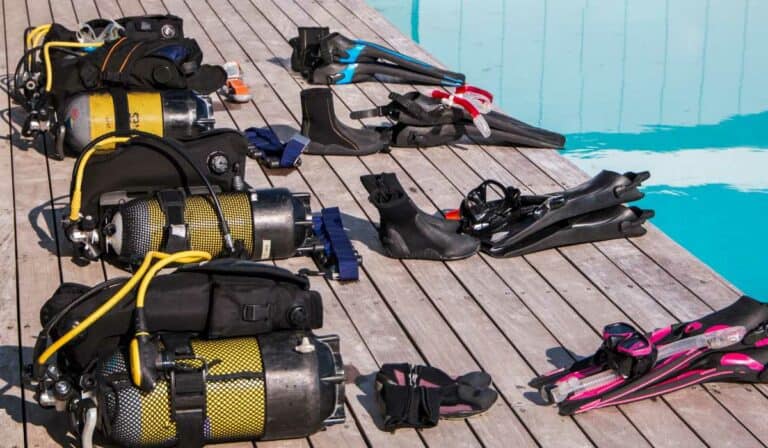Scuba Diving With Health Conditions: Diving with Caution
Scuba diving with medical issues can be a tough yet fulfilling journey for those who want to discover the depths of the ocean. It is essential to understand how various health issues may impact your ability to dive safely and enjoyably. In this blog post, we will examine how various health conditions may impact scuba diving and provide strategies to help divers manage them.
We dive into scuba diving with heart conditions, respiratory issues, diabetes, high blood pressure, epilepsy, and ear and sinus problems – all of which are important factors when considering scuba diving with health conditions. By understanding these challenges and taking appropriate precautions, you can continue pursuing your passion for recreational scuba diving while maintaining optimal well-being.
Table of Contents
1. Heart Conditions

Scuba diving is an exhilarating and adventurous activity that allows you to explore the underwater world. However, it’s essential to consider your health before taking the plunge, especially if you have a heart condition. Scuba diving with heart conditions can pose significant risks due to increased physical exertion and changes in pressure experienced during dives.
A. Potential Risks for Divers with Heart Conditions
- Increased workload on the heart: The physical demands of scuba diving can increase your heart rate and blood pressure, which may be problematic for those with existing cardiac issues.
- Cold water immersion: Cold water can cause vasoconstriction (narrowing of blood vessels), leading to increased strain on the heart as it works harder to pump blood throughout the body.
- Oxygen deprivation: As divers descend deeper into the ocean, there is less available oxygen; this could exacerbate any pre-existing cardiovascular problems.
B. Precautions for Divers with Heart Conditions
If you have a known heart condition but still want to enjoy scuba diving safely, follow these precautions:
- Talk to your doctor first: Before attempting scuba diving, consult your doctor to assess the risks and benefits based on your medical history and current health. DAN – Cardiovascular Fitness & Diving Article
- Maintain good overall fitness: Prioritize regular exercise and a healthy diet to help reduce the risk of diving-related complications.
- Choose appropriate dive sites and conditions: Select shallow, calm waters with minimal currents to minimize physical exertion during your dives. Scuba Diving Safety Tips
- Dive with a buddy who knows about your condition: Ensure that your dive partner is aware of your heart condition and can assist you in case of an emergency.
In conclusion, scuba diving with a heart condition requires careful consideration and consultation with medical professionals. By taking necessary precautions and maintaining good overall health, it’s possible for individuals with certain cardiac issues to enjoy the underwater world safely. Always remember that safety should be the top priority when participating in any adventurous activity like scuba diving.
Heart conditions can be managed and treated while still allowing individuals to safely enjoy the wonders of scuba diving. Respiratory issues, however, present a unique set of challenges that require careful consideration before attempting any underwater activity.
Key Takeaway:
Scuba diving with a heart condition can be risky due to increased physical exertion and changes in pressure. Cold water immersion, oxygen deprivation, and an increased workload on the heart are potential risks for divers with heart conditions. To safely scuba dive with a known heart condition, it is important to talk to your doctor first, maintain good overall fitness, choose appropriate dive sites and conditions, and always dive with a buddy who knows about your condition.
Click here to read about The Costs Of Buying Your Own Scuba Equipment
2. Respiratory Issues
Scuba diving can be an incredible experience, but for those with respiratory issues, it’s essential to understand the potential complications and risks involved. Breathing underwater requires a well-functioning respiratory system to ensure adequate gas exchange and prevent accidents.
Asthma
Asthma sufferers may face challenges while scuba diving due to their increased sensitivity to changes in air pressure and humidity. Cold water or exercise-induced asthma can also trigger symptoms during a dive. However, not all asthmatics are automatically disqualified from scuba diving; controlled asthma with no recent attacks might still allow you to enjoy this activity under proper supervision.
- Before attempting scuba diving, it is advisable to consult a doctor.
- If cleared by your physician, always carry necessary medications such as inhalers during dives.
- Dive within your limits and avoid strenuous activities that could exacerbate symptoms.
COPD (Chronic Obstructive Pulmonary Disease)
COPD patients, including chronic bronchitis and emphysema sufferers, should be cautious when considering scuba diving due to their reduced lung function. The full exhalation capacity may be hindered, possibly resulting in the air becoming stuck in the lungs and consequently causing barotrauma or a pneumothorax (lung collapse).
- Talk with your healthcare provider about whether scuba diving is safe for you.
- Consider alternative underwater activities like snorkeling that pose less risk to your respiratory system.
Pneumothorax and Chest Surgery
If you’ve had a pneumothorax (collapsed lung) or recent chest surgery, it’s crucial to discuss with your doctor whether scuba diving is safe for you. The pressure changes during dives can cause complications in the healing process and increase the risk of another pneumothorax. Generally, a waiting period of at least six months after surgery is recommended before attempting any form of diving.
In conclusion, while respiratory issues may present challenges for aspiring scuba divers, they don’t always mean an end to underwater adventures. Consultation with healthcare professionals and adherence to safety guidelines can help mitigate risks and allow individuals with certain conditions to enjoy this thrilling activity responsibly.
For those with respiratory issues, it is important to consult a physician prior to scuba diving and understand the risks associated. Prior to scuba diving, those with diabetes should take precautions in order to ensure a safe and enjoyable experience.
Key Takeaway:
Though respiratory issues such as asthma and COPD may present challenges, scuba diving can still be undertaken with caution. Consultation with doctors and carrying necessary medications can help mitigate these risks, while alternative activities like snorkeling may be safer options. Those who have had pneumothorax or chest surgery should wait at least six months before attempting any form of diving.
Click here to read about Scuba Safety: Rules Everyone Must Follow While Diving
3 . Scuba Diving With Diabetes

For individuals with diabetes, it is essential to take extra precautions before taking the plunge into underwater exploration. In this section, we’ll examine the safety of scuba diving for individuals with diabetes and discuss some important considerations to keep in mind.
Risks Associated with Scuba Diving and Diabetes
Diabetics may experience difficulties with participating in scuba diving as their body’s capacity to manage glucose levels is impaired. Some potential risks associated with scuba diving for diabetics include:
- Hypoglycemia: Low blood sugar levels can lead to dizziness, confusion, and even unconsciousness – all dangerous situations while submerged underwater.
- Hyperglycemia: High blood sugar levels may result in dehydration or diabetic ketoacidosis (DKA), which could cause disorientation during a dive.
- Infection risk: Diabetic divers are more susceptible to infections from cuts or scrapes sustained during dives due to slower healing times.
Precautions for Diabetic Divers
If you have diabetes and want to explore the depths of the ocean safely, consider these precautions before embarking on your adventure:
- Maintain good overall health, including regular exercise and proper nutrition as recommended by your healthcare provider.
- Tightly control your blood glucose levels both before and after each dive using a continuous glucose monitor (CGM) if possible.
- Always carry a quick source of glucose, such as glucose tablets or gel, to treat potential hypoglycemia during surface intervals.
- Dive with a buddy who is aware of your condition and knows how to recognize and respond to any diabetes-related emergencies.
Guidelines for Scuba Diving with Diabetes
The Divers Alert Network (DAN) has established guidelines for individuals with diabetes who wish to scuba dive safely. Some key recommendations include:
- Avoid diving if you have experienced severe hypoglycemia within the past year or have frequent episodes that require assistance from others.
- Monitor blood sugar levels closely before, during, and after dives – aiming for levels between 150-300 mg/dL (8.3-16.7 mmol/L) before entering the water.
- Limit dive depths to no more than 100 feet (30 meters) and avoid decompression dives.
In conclusion, scuba diving can be a safe and enjoyable activity for individuals with diabetes as long as proper precautions are taken. By following the guidelines established by organizations like DAN and working closely with your healthcare provider, you can explore the wonders of the underwater world with confidence.
Diabetes need not impede scuba diving, so long as the diver is careful and heeds their doctor’s counsel. High blood pressure, on the other hand, can be more of an issue when it comes to participating in this activity; therefore it is important for divers with hypertension to consult their physician before engaging in any underwater activities.
Key Takeaway:
Scuba diving can be a hazard for people with diabetes since their body may not regulate glucose levels efficiently. To dive safely, it is important to maintain good overall health, tightly control blood glucose levels using a continuous glucose monitor (CGM), carry a quick source of glucose, and dive with a buddy who knows how to recognize and respond to any diabetes-related emergencies. The Divers Alert Network (DAN) has established guidelines for safe scuba diving with diabetes, including monitoring blood sugar levels closely before and after dives and limiting dive depths.
4. High Blood Pressure
Diving with hypertension can be a source of worry, as it may lead to various difficulties while underwater. In this section, we will analyze the dangers associated with scuba diving for those who have hypertension and discuss some precautionary measures that can help mitigate these risks.
Click here to read about Best Scuba Diving Accessories for a Comfortable and Enjoyable Dive
A. Dangers of Scuba Diving with High Blood Pressure
- Decompression sickness: Also known as “the bends,” decompression sickness is caused by nitrogen bubbles forming in the bloodstream due to rapid changes in pressure during ascent from a dive. People with high blood pressure are at an increased risk because their circulatory system may not effectively eliminate these gas bubbles.
- Pulmonary edema: This condition occurs when fluid accumulates in the lungs, making it difficult to breathe. The added stress on your heart from diving could potentially trigger pulmonary edema if you already have high blood pressure.
- Heart attack or stroke: The physical exertion required during scuba diving puts additional strain on your cardiovascular system which might lead to a heart attack or stroke if you have uncontrolled hypertension.
B. Precautions and Tips for Divers with Hypertension
If you suffer from high blood pressure but still want to enjoy scuba diving safely, consider following these tips:
- Maintain good control over your condition: The first step is ensuring that your hypertension is well-managed through medication, diet, exercise, and regular check-ups with your healthcare provider. This will help reduce the risk of complications while diving.
- Get clearance from your doctor: Before diving, make sure to get clearance from your doctor. They may recommend additional precautions or advise against diving altogether depending on the severity of your condition.
- Take it slow: Avoid rapid ascents and descents, and take your time while diving to reduce the risk of decompression sickness.
- Monitor your body: Pay attention to any symptoms or changes in your body while diving, and don’t hesitate to end the dive early if you start feeling unwell.
It’s essential to consult a physician prior to scuba diving in order to assess any potential dangers related to it, however high blood pressure can be controlled by both proper medical attention and modifications in lifestyle. With epilepsy, there are even more considerations that must be taken into account when deciding whether or not to dive.
5 . Scuba Diving With Health Conditions

However, for those with certain health conditions, scuba diving can be risky. In this article, we will focus on scuba diving with epilepsy and provide tips on how to minimize the dangers associated with this condition.
Epilepsy and Scuba Diving: The Risks
The primary concern when it comes to scuba diving with epilepsy is the potential for seizures while underwater. Seizures may cause loss of consciousness, leading to potential drowning or other severe issues such as decompression sickness (DCS) and arterial gas embolism (AGE). Additionally, certain factors present during a dive may increase seizure risk:
- Pressure changes: Rapid pressure changes experienced during descent and ascent can trigger seizures in some individuals.
- Hyperventilation: Anxiety or improper breathing techniques might cause hyperventilation, leading to an increased likelihood of seizures.
- Cold water immersion: Exposure to cold water has been known to provoke seizures in susceptible individuals.
Tips for Scuba Diving Safely With Epilepsy
If you have epilepsy but still wish to experience the wonders of scuba diving, there are several precautions you should take before getting started:
- Talk To Your Doctor First: Your doctor knows your medical history best and can advise whether scuba diving is safe based on your specific circumstances. They may also recommend adjustments to medications that could reduce seizure risk while underwater.
- Dive With A Buddy Who Knows Your Condition: Always dive with a buddy who is aware of your epilepsy and knows how to respond in case of an emergency. This person should be trained in rescue techniques, including what to do if you have a seizure underwater.
- Choose Calm, Warm Waters: Opt for diving locations with calm waters and warmer temperatures to minimize the risk of cold water-induced seizures.
- Maintain Proper Breathing Techniques: Practice proper breathing techniques before diving, as hyperventilation can increase seizure risk. Focus on slow, deep breaths while staying relaxed throughout the dive.
In conclusion, it’s important to remember that scuba diving carries inherent risks for everyone – not just those with epilepsy or other health conditions. However, by taking appropriate precautions and consulting with medical professionals beforehand, many individuals living with epilepsy can still enjoy the thrilling experience of exploring our planet’s underwater wonders safely.
For more information about scuba diving safety guidelines and recommendations for people with specific health conditions like epilepsy, check out this informative article from Divers Alert Network.
Before scuba diving, consulting a physician is essential if you have epilepsy as it can be a major factor in the activity. Ear and sinus problems may also affect one’s ability to safely dive, so the same considerations should be taken into account for those issues as well.
Key Takeaway:
Scuba diving with epilepsy can be risky due to the potential for seizures underwater. However, individuals with epilepsy can still enjoy scuba diving by taking precautions such as consulting their doctor, diving with a buddy who knows their condition, choosing calm and warm waters, and practicing proper breathing techniques.
6 . Ear and Sinus Problems
The pressure changes experienced during a dive can cause discomfort or even injury if you have pre-existing conditions affecting your ears or sinuses.
Middle Ear Barotrauma
Middle ear barotrauma is one of the most common issues faced by divers with ear problems. It occurs when there is an imbalance in pressure between the middle ear and surrounding water due to improper equalization techniques or blocked Eustachian tubes. This can lead to pain, temporary hearing loss, and even permanent damage if not addressed promptly.
Outer Ear Infections (Swimmer’s Ear)
Divers who are prone to outer ear infections (swimmer’s ear) should take extra precautions when scuba diving as they may be more susceptible to infection from bacteria present in seawater. Symptoms of a swimmer’s ear may include itching, redness, swelling and discharge from the affected area.
Sinus Issues
Sinus congestion caused by allergies or colds can make equalizing difficult while diving due to blocked air passages connecting your nasal cavity and sinuses (source). This could result in painful sinus squeeze which might lead to inflammation of the sinus lining and even nosebleeds.
Click here to read about Scuba Diving While Pregnant: What Every Woman Must Know
Precautions for Divers with Ear and Sinus Problems
- Consult your doctor before diving to ensure it’s safe for you, especially if you have a history of ear or sinus issues.
- Practice equalization techniques like the Valsalva maneuver or Toynbee maneuver to help maintain pressure balance in your ears during a dive.
- Avoid diving when experiencing colds, allergies, or any form of nasal congestion that could hinder proper equalization.
- Use earplugs specifically designed for divers to minimize water exposure in the outer ear canal while still allowing equalization (source).
In conclusion, scuba diving with ear and sinus problems is possible but requires extra care and attention. By understanding potential hazards associated with these conditions and taking necessary precautions, you can safely enjoy the underwater world without compromising your health.
Key Takeaway:
Scuba diving can be dangerous for those with ear and sinus problems due to pressure changes. Middle ear barotrauma, outer ear infections, and sinus issues are common hazards faced by divers. To prevent injury or discomfort, it’s important to consult a doctor before diving, practice equalization techniques, avoid diving during congestion or illness, and use specialized earplugs designed for divers.
FAQs about Scuba Diving With Health Conditions
What Health Conditions Prevent You from Scuba Diving?
Health conditions that may prevent you from scuba diving include severe heart or lung problems, uncontrolled diabetes, epilepsy, high blood pressure not controlled by medication, and ear or sinus issues. It is essential to consult with a medical professional before engaging in scuba diving if you have any of these conditions.
How Does Scuba Diving Affect Your Health?
Scuba diving can positively impact your physical and mental well-being by improving cardiovascular fitness, increasing strength and flexibility, reducing stress levels, and promoting relaxation. However, it also poses potential risks such as decompression sickness (DCS), barotrauma (pressure-related injuries), and nitrogen narcosis if proper safety precautions are not followed.
What Are the Health Risks for Divers?
The main health risks for divers include decompression sickness, barotrauma, nitrogen narcosis (the “martini effect”), oxygen toxicity (CNS toxicity), and hypothermia. Proper training, adhering to dive limits and guidelines, and using appropriate equipment can minimize these risks significantly.
Do You Have to Be in Good Health to Scuba Dive?
Yes, being in good health is essential for safe scuba diving. A medical evaluation by a qualified professional is recommended before starting any diving activities. Divers should maintain their physical fitness and follow safety guidelines to minimize risks associated with the sport.
Conclusion
Scuba diving is a thrilling, daring pursuit that anyone can partake in – even those with health conditions. However, it’s essential to take precautions and consult a physician before taking the plunge. Individuals with heart conditions, respiratory issues, diabetes, high blood pressure, epilepsy, ear, and sinus problems need to take extra care when scuba diving.







